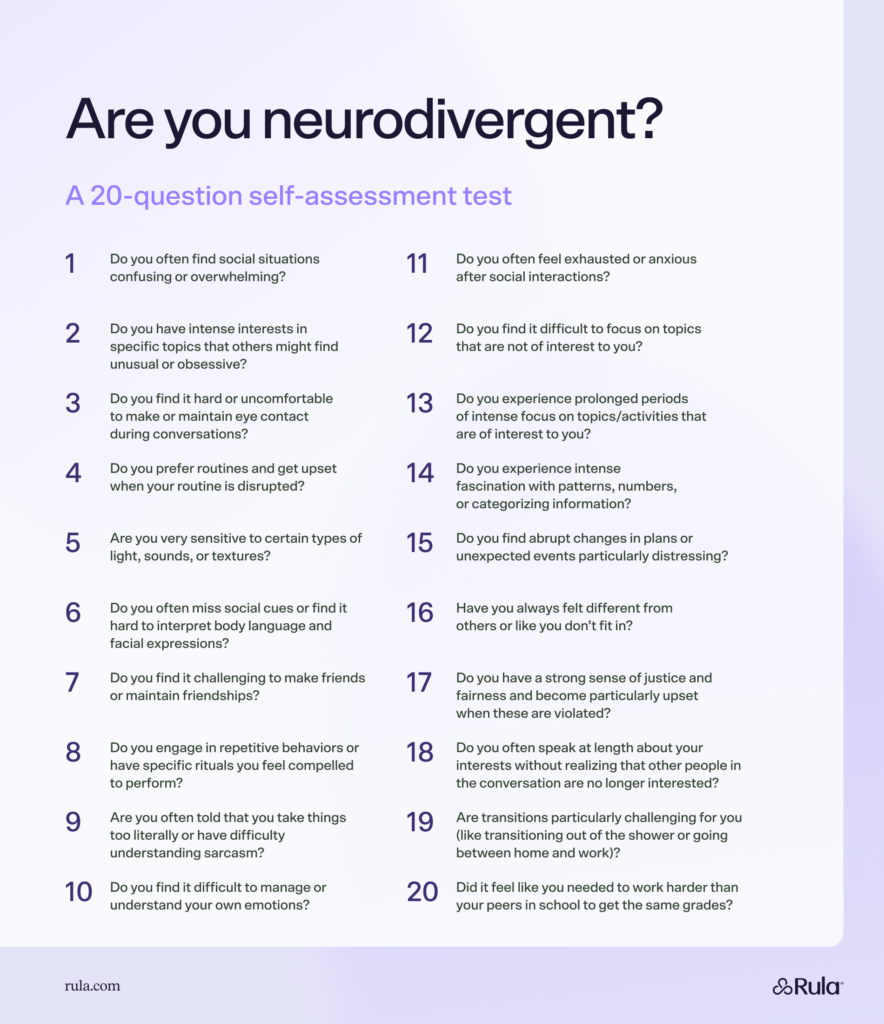Neurodivergence is a non-clinical term used to acknowledge and celebrate the fact that human brains work in different ways.
Neurodivergence is often associated with certain developmental and mental health conditions. Depending on the individual and their environment, neurodivergence can create strengths and challenges.
Different neurodivergent people can benefit from various levels of support. With the right accommodations, many neurodivergent people can thrive at home, school, and work.
The term “neurodivergence” has been gaining popularity lately. But since it’s not a medical or diagnostic term, there’s some confusion about what it really means. Most of the time, it’s used to describe the experience of people living with conditions like attention-deficit hyperactivity disorder (ADHD), autism spectrum disorder (ASD), and dyslexia.
Symptoms of these conditions can create both challenges and incredible gifts and talents for the people living with them. So if you’ve ever wondered what it means to be neurodivergent, know that there isn’t one simple definition of the experience. By learning more about some common signs of neurodivergence, you can better understand yourself and know when it might be time to ask for support.
What is neurodivergence?
Broadly speaking, when someone has a neurodivergence, it means that their brain works a bit differently than the majority. These differences tend to show up within certain categories, like social interaction or sensory sensitivity. But in general, they affect how a person thinks and relates to the world around them. Just as no two human beings are completely alike, no two human brains are completely alike.
While there’s no such thing as a “normal” brain, people who are not neurodivergent are referred to as “neurotypical.” As you learn more about neurodivergence, remember that differences are not deficits. After all, some of the most creative innovations in our history would not exist today if everyone’s brains worked the same way.
Since neurodivergence isn’t a medical term or diagnosis, we don’t have concrete information on what causes it. However, some conditions associated with neurodivergence have been linked to certain genetic, environmental, and developmental factors. For example, research shows that you’re more likely to develop ADHD if:
You have a close relative, like a sibling or parent, who also has ADHD.
You experience a severe brain injury.
You were prenatally exposed to harmful substances like alcohol or tobacco.
You had a low birth weight.
You were born prematurely.
These factors may correlate with neurodivergence, but we don’t have enough research to establish a direct link.
The care you need, when you need it
Learn how Rula can support your mental health journey
What are the common symptoms of neurodivergence?
There is a wide spectrum of symptoms associated with neurodivergence. But some common symptoms may indicate that you’re neurodivergent.
You may be neurodivergent if:
You tend to get overwhelmed easily in social situations.
Sarcasm is often lost on you because you interpret things literally.
Certain sights, sounds, smells, and sensations really bother you.
You have very specific hobbies or interests.
You have trouble focusing on tasks or topics that don’t interest you.
You need a routine to feel at peace, or you have a hard time keeping a routine.
You have a hard time learning in traditional academic environments.
It’s easy for you to identify patterns or make sense of complex problems.
It’s hard for you to express yourself and talk about what you’re feeling.
You sometimes struggle to organize your thoughts.
You are highly creative, an excellent problem solver, or both.
Again, all brains work differently, and there’s no such thing as a “normal” human brain. Thinking and learning differences can vary widely from person to person, and all neurodivergent people have unique strengths and challenges.
Are you experiencing symptoms of neurodivergence? Self-assessment test
Please note that the following questions are designed to help you get to know yourself better and recognize possible traits of neurodivergence. This test is not a replacement for a clinical evaluation.
Keep in mind that you cannot be officially diagnosed as neurodivergent because it’s not a medical or mental health condition. Rather, it’s a term that describes people with certain neurodevelopmental conditions. But if you answer “yes” to several of the following questions, you may benefit from some additional support.*
Do you often find social situations confusing or overwhelming?
Do you have intense interests in specific topics that others might find unusual or obsessive?
Do you find it hard or uncomfortable to make or maintain eye contact during conversations?
Do you prefer routines and get upset when your routine is disrupted?
Are you very sensitive to certain types of light, sounds, or textures?
Do you often miss social cues or find it hard to interpret body language and facial expressions?
Do you find it challenging to make friends or maintain friendships?
Do you engage in repetitive behaviors or have specific rituals you feel compelled to perform?
Are you often told that you take things too literally or have difficulty understanding sarcasm?
Do you find it difficult to manage or understand your own emotions?
Do you often feel exhausted or anxious after social interactions?
Do you find it difficult to focus on topics that are not of interest to you?
Do you experience prolonged periods of intense focus on topics/activities that are of interest to you?
Do you experience intense fascination with patterns, numbers, or categorizing information?
Do you find abrupt changes in plans or unexpected events particularly distressing?
Have you always felt different from others or like you don’t fit in?
Do you have a strong sense of justice and fairness and become particularly upset when these are violated?
Do you often speak at length about your interests without realizing that other people in the conversation are no longer interested?
Are transitions particularly challenging for you (like transitioning out of the shower or going between home and work)?
Did it feel like you needed to work harder than your peers in school to get the same grades?
*_Quiz content written by Lolly Coleman, MS, LMFT._
Interpreting your quiz results
If you think about it, almost anyone could answer “yes” to at least one of these questions at some point in their lives. For example, you might know what it’s like to feel exhausted after a long or difficult day of socializing. Or perhaps you have a hobby you love that dominates much of your time. These factors alone don’t necessarily indicate that you are neurodivergent.
But if you answered “yes” to many of the questions and you’re having a hard time in certain important areas of your life (like your job or relationships), it might be helpful to talk to a mental health professional. Different people experience neurodivergence differently, and there are many different types and levels of support that can help you.
Next steps after the quiz
If you took the quiz and you think you might be neurodivergent, you’re probably wondering what to do next. Keep in mind that not all neurodivergent people need the same type and level of support. In fact, some may require very little or none at all.
But if your results give you cause for concern and you’re having a hard time in some important areas, know that you’re not alone and help is available. A mental health professional can help you set goals, learn new coping skills, and identify the accommodations that could be helpful for you.
How is neurodivergence diagnosed?
Neurodivergence is not a recognized mental health or developmental condition. And it’s not an impairment that requires treatment. Rather, it’s a term that people use to acknowledge and celebrate the fact that our brains work in different ways. Many people find comfort in using the term “neurodivergent” to describe a part of their experience. But it’s up to you whether you want to identify as neurodivergent.
Sometimes, these differences can create challenges, depending on the individual and their environment. In those cases, it might be helpful to talk to a therapist about your experience. While they can not officially diagnose you as neurodivergent, they may be able to diagnose you with a specific condition like autism, ADHD, or dyslexia. And they can help you identify patterns that might mean you could benefit from some added support.

Find care with Rula
When you need support to navigate neurodiversity, know that help is just a few clicks away. At Rula, we collaborate with an extensive network of therapists. So you can meet with someone from the comfort of your home as soon as tomorrow.
To start the process, check out our therapist matching program to find an in-network provider who specializes in your area(s) of concern. And remember, whether you need help setting up your first appointment or with any other concerns, our team is here to offer support and guidance throughout your experience.
Rula's editorial process
Rula's editorial team is on a mission to make science-backed mental health insights accessible and practical for every person seeking to better understand or improve mental wellness.
Members of Rula’s clinical leadership team and other expert providers contribute to all published content, offering guidance on themes and insights based on their firsthand experience in the field. Every piece of content is thoroughly reviewed by a clinician before publishing.





